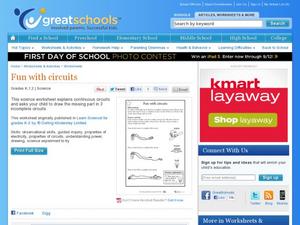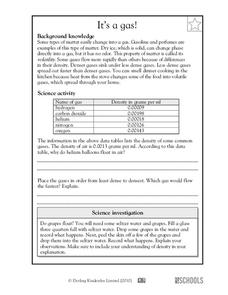Curated OER
Drugs and Safety Precautions
Drugs can both help and harm depending on how they are used. Fifth graders complete a worksheet that provides background information on prescription drugs. They read the text and then describe why medication manufacturers label pill...
Curated OER
Drugs Can Be Good and Bad
How can you tell which drugs are helpful, and which drugs are harmful? Use a health learning exercise in your kindergarten class to determine which drugs can make you healthy. They choose from a group of pictures that includes cough...
Curated OER
No Shadow of Doubt
Fifth graders must use a pencil to draw in the shadows they think will be formed by a house, a greenhouse, and a tree. The sun is behind each of these objects, and an open field is in front of them. That's where pupils draw their...
Curated OER
Exercise and the Human Heart
Interpret data and learn about the human heart in one activity! After learning about the way blood flows in the body, fifth graders answer two questions about a graph displaying pulse rate. They then take their own pulses to find the...
Curated OER
Fast and Slow Motion
Explore the world of motion and force with an activity for kindergarten and first grade. After determining how people can make balls or bikes move slower, kids use a cardboard tube and a marble to experiment with motion and speed. A...
Curated OER
Flower Power
Determine which plants are flowering plants with a helpful lab sheet. Kids first observe illustrations of different plants, such as a carnation and a fern, then decide which plants produce flowers, spores, or cones. Use magazine pictures...
Curated OER
It's Freezing!
Here is a good worksheet for 5th grade scientists. In it, they look at a bar graph that shows the freezing point for a variety of liquids. Then, they are given a scenario of a certain liquid melting and freezing, and must determine which...
Curated OER
For a Change
Here is a worksheet that has young scientists think about things that been changed as a result of heating and cooling, and if they can be returned to their original form. There are seven scenarios to consider, and they must choose,...
Curated OER
Fun with Circuits
What kinds of things need electricity to work? Kids draw the missing parts to three incomplete circuits in a worksheet about power and electricity. The science exploration asks them to build a circuit to a light bulb, but this might be a...
Curated OER
It's A Gas!
Fifth graders complete a worksheet which has them place a list of gases in order from the least to the most dense. The density in grams is given for each. There's a good paragraph which provides background knowledge about the volatility...
Curated OER
Good Vibrations
Third and fourth graders should enjoy this easy-to-implement activity involving a straw, and bottles filled with water. Learners manipulate the end of a straw in a way that results in a sound being made when it's blown. There is also an...
Curated OER
Good Drugs, Bad Drugs
Add a science experiment on medicine and drugs to your health lesson. After reading a paragraph on the difference between helpful and harmful drugs, kids choose which pictures of bottles they could find at a pharmacy. The last activity...
Curated OER
Name That Gas!
Young scientists discover that air is a mixture of different gases - mainly nitrogen and oxygen. The properties of some of the other gases found in oxygen are listed in a table, then learners must decide which one of those gases is...
Curated OER
Whose Home Is This?
After reading a short and informative paragraph on animals and their environments, learners look at pictures of four animals, and write a short description of how each one has adapted to its environment. A suggested activity is that each...
Curated OER
How hard is it?
Inquiry is probably one of the most fun ways kids learn. They will test the hardness of 10 different minerals in order to classify them. They rate each of the minerals from most to least hard. Note: Having real minerals for this...
Curated OER
What a Hard Test!
Fifth graders complete an exercise that introduces them to Moh's scale of mineral hardness. The scale is presented on the worksheet, and learners answer three questions which have them assign a hardness rating based on some clues. For...
Curated OER
The Plant Food Factory
Plants need sun and water to survive. Let kids discover these facts by reading a block of informational text and considering a scientific quandary. They read the text, then use the information to complete a two-part question about plant...
Curated OER
You've Got to Have Heart
After reading an excellent description of the human heart, fifth graders look at a drawing of a human body, and choose the circle they think represents where the human heart is found. There are four circles inside the character's chest....
Curated OER
Is it alive?
Kids in grades K-2 increase their logical reasoning and visual discrimination skills by determining which things shown are alive. They use the criteria that all living things move on their own to mark each image as alive or not.
Curated OER
Is It See-Through?
Explore transparancy with a science experiment on different materials. After reading an explanation on how to determine if something is see-through with a flashlight, kindergartners decide if certain materials are opaque or not....
Curated OER
It Can Be a Shocker!
It's important for young learners to understand how dangerous electricity can be, and how to avoid getting shocked. This activity enlightens them on how to avoid getting shocked, then has them answer Yes or No to eight questions...
Curated OER
It's too loud!
Investigate soft, loud, and dangerous sounds. Little ones put a check next to the sounds that are loud, an X next to ones that are soft, and circle the ones that would require protective ear wear. Tip: Get out a tape player or computer...
Curated OER
Materials We Use
How can you tell if something is made out of wood, metal, or plastic? Kids use noise and visual cues to determine what various household items are made from. They then examine their toys at home and record the materials used to make...
Curated OER
Name That Leaf
Take a walk through nature with a science experiment about leaves. Third graders use a branching diagram to group attributes of certain kinds of leaves, such as oak, pine, and chestnut. For extra practice, they can collect leaves and...
Other popular searches
- Calculus Limits
- Pre Calculus Limits
- Limits and Continuity
- Pre Calculus With Limits
- Legal Limits
- Limits on Populations
- Functions and Limits
- Limits to Population Growth
- Limits Composite Functions
- Sexual Limits
- Constitutional Limits
- Pre Calculus Limits

























